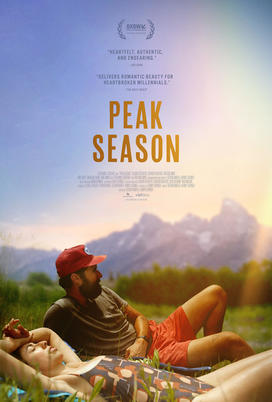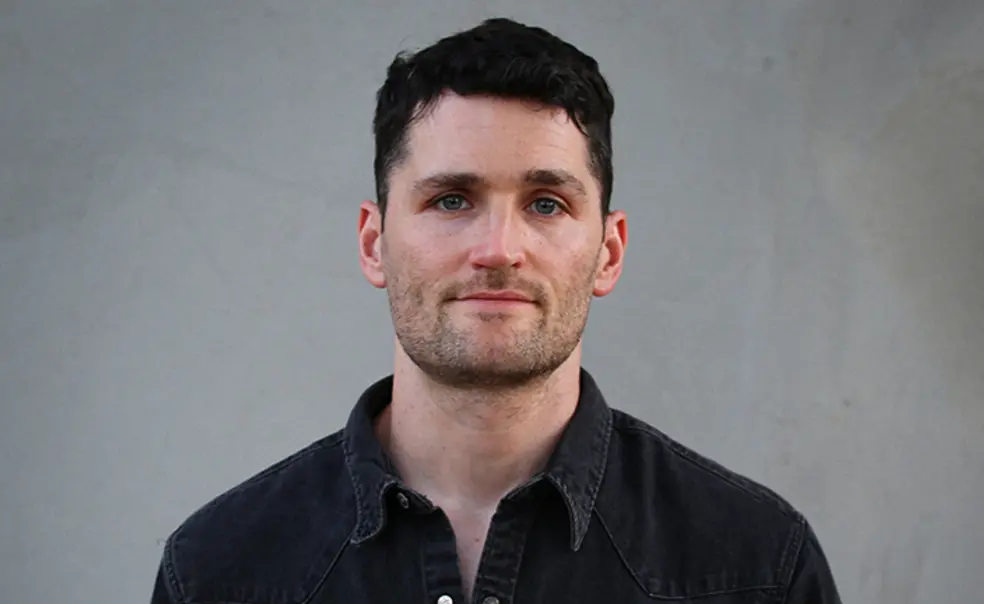Henry Loevner ’11 Leverages Wyoming Connections for New Independent Film
Loevner draws out Jackson Hole’s wealth divide in the storyline of ‘Peak Season’
For Henry Loevner ’11, the most challenging day of shooting Peak Season, the second feature film he co-directed with Steven Kanter, was a 7.4-mile roundtrip hike to Delta Lake in Grand Teton National Park. Not only did his ragtag crew and actors have to scale the trail’s 3,000 feet of elevation, but the actors had to film multiple takes of scenes (and re-scale parts of the mountain trail) every time a casual hiker wandered into the frame. “It all lent itself to a kind of an authenticity,” Loevner says. “That’s real sweat and dirt on [the actors], but yeah … that was the hardest day.”

Peak Season, which was featured at the 2023 South by Southwest festival and had a limited theater run in August, is set in Jackson Hole, Wyoming. The storyline brings together a carefree wilderness guide and a burned-out New Yorker, but it “isn’t quite the simple-minded story of a city slicker who finds peace in the countryside that it initially appears to be,” according to a New York Times reviewer.
Loevner grew up in Princeton, about a 10-minute walk from campus. He was always interested in film, and after majoring in politics, he worked as an associate producer at a production company in Shanghai, China, for a few years before moving to Los Angeles to pursue a career in Hollywood. “The Princeton alumni network is so robust and people are so willing to help, particularly in film and TV,” Loevner says. In the end, a stint as a video producer at Buzzfeed served as his “film school,” where he developed a lot of practical production experience crafting short videos and formed a troupe of trusted collaborators, including his co-writer and co-director Steven Kanter, as well as the film’s central actors, Claudia Restrepo, Derrick Joseph DeBlasis, and Ben Coleman. Loevner’s first feature film was The End of Us (2021), a romantic comedy set during the COVID-19 pandemic.
In the late 2000s, Loevner’s parents moved to Jackson Hole, and as Loevner came to spend more time there, he became curious about the living situations of wilderness guides who worked various odd jobs to support themselves in expensive resort communities, research that inspired Peak Season. “I wanted to make a movie about this really specific community that is suffering from all these endemic economic problems because of very wealthy people moving in and driving up the cost of living,” Loevner says.
Loevner’s family ties to the area also gave the production access to important locations in the town — like the world-famous Million Dollar Cowboy Bar — that other small-budget filmmakers coming from outside the area might not be able to pursue. “Because Henry and his family have such a deep network of roots and connections in Jackson Hole, we were able to go right to the source for a lot of these great locations that most filmmakers would not have access to just because they’re kind of a ‘locals-only’ spot,” says Lovell Holder ’09, a producer on the film.
Seen through the eyes of his collaborators, climbing into Hollywood may be a lot like scaling the mountains of Grand Teton — rewarded only through great effort and ingenuity. “When I think of Henry, I just am constantly in awe of what he’s able to accomplish solely through his own intelligence and persistence,” Holder says.
For Loevner, the journey all started with Princeton. “Princeton gave me not only a strong sense of self-confidence that I can set a goal and achieve it,” Loevner says, “but also a sense of self-reliance, because of their emphasis on independent work. … In order to be a filmmaker today, it’s crucial to make your own stuff.”
Watch the trailer for Peak Season:












No responses yet